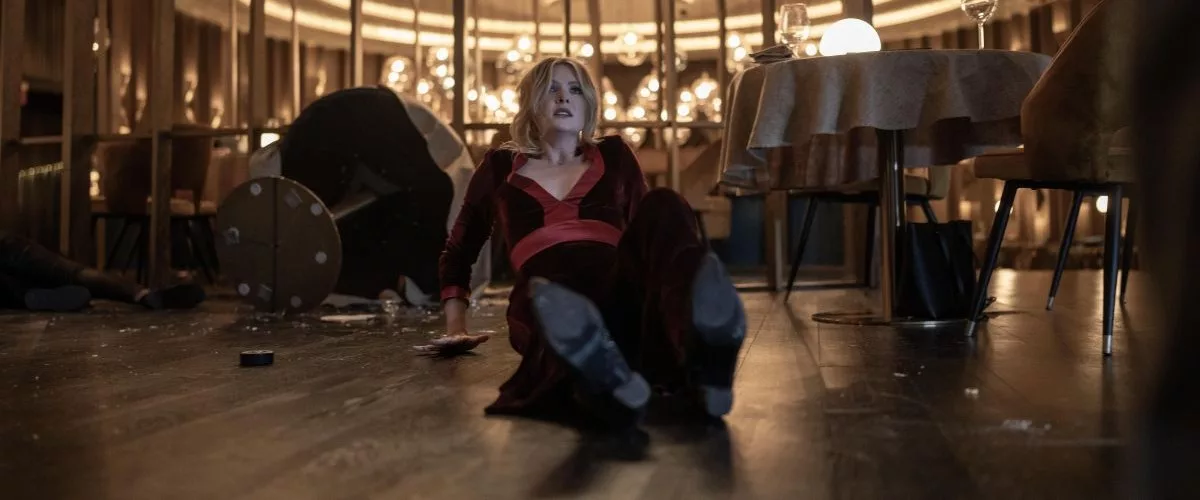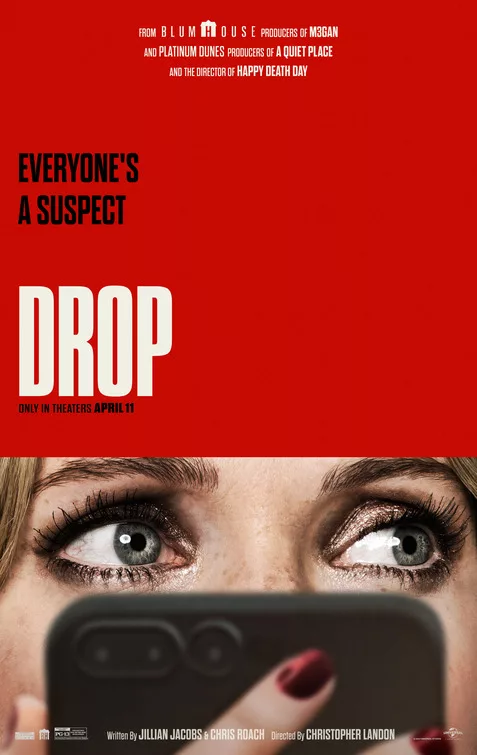It can be so refreshing to see an efficient thrill ride of a movie, a flick that knows what it wants to do and doesn’t waste time doing it. Christopher Landon’s “Drop” is one of those films, a thriller that unfolds in two locations with few characters, all in pursuit of providing as much entertainment as possible to ticket buyers. It is a film built around new-fashioned technology but with old-fashioned charm in its structure and star power. Meghann Fahy (“The White Lotus”) and Brandon Sklenar (“1923”) may have reached their highest peaks of fame so far in television, but these are movie stars, people that the camera loves to linger on as they struggle their way through an unimaginable night. They have that hard-to-quantify thing called screen presence, something that some of the best thrillers ever made used as a foundation for generations of filmmaking.
I’m not saying “Drop” is one of the best thrillers ever made. But at a time when it feels like so many movies like this can’t settle on an identity, there’s something purely entertaining about seeing a movie that’s designed like a rollercoaster. Watch the first drop. It’s a doozy.
Fahy plays Violet, who is introduced in a scene of terrifying violence with her abusive partner. The father of her son Toby (Jacob Robinson) ends up dead—whether Violet killed him or not remains a mystery for the film to reveal—and Violet has been understandably reticent to return to the dating scene. Years after that prologue, she’s finally ready to go to dinner with someone she’s been texting named Henry (Sklenar). He’s booked a table at a fancy Chicago restaurant named Palate, high above the Windy City. He’s running a little late and tells her to meet him at the bar, and that’s when this thrill ride starts ascending. After a few casual encounters with other people at the restaurant, like the hostess, bartender, piano player, and a hapless fellow on a blind date, Violet gets a series of drops to her phone using an app called “DigiDrop.” They’re coming from someone no more than 50 feet away—so in the restaurant—and they seem innocuous at first, maybe some playful meme shit from the table of prom kids in the room, but they get dark quickly. One reveals that they have a masked man at Violet’s home, ready to murder Toby and Violet’s sister, Jen (Violett Beane). Violet has to do everything the mysterious dropper says, or her sister and son will be murdered.
Of course, the main instruction for a thriller like this one is always that Violet can’t tell anyone. A lot of the first half of the film consists of Violet trying to ask for help but being unable to get that message to the right people, a narrative structure that plays as a sharp commentary on abused women being trapped by a system that doesn’t hear them. As her charming date patiently pushes through Violet’s erratic behavior, I started to worry that “Drop” would be a film about Prince Charming saving the day once he finally figures out that his date is being tormented. Still, Jillian Jacobs & Chris Roach’s script smartly avoid that trope. This is Violet’s story through and through, a tale of a survivor forced once again to do whatever it takes to save herself and her son.
Sometimes, small-screen actors lose a bit of what makes them special when they jump to the big one. But that is absolutely not the case with Fahy, who has a striking immediacy here. If we don’t buy what Violet is going through, if we start questioning the admittedly convoluted machinations of the thriller plot machine, then “Drop” would fall. Fahy never lets that happen, and Landon smartly recognizes his greatest asset, rarely leaving her side. We become her partners in this nightmare, as uncertain of who is torturing her, why this is happening, or how to get out of it. The director of “Happy Death Day” and “Freaky” leaves most of the humor of those films behind to pivot to something more grounded, but he also never takes himself too seriously. He’s a talented director, and he works with talented collaborators—especially editor Ben Baudhuin and the great composer Bear McCreary—to present a cohesive vision that never takes itself too seriously but thrills, nonetheless.
In retrospect, some of the plotting in “Drop” feels a bit nonsensical—the entire plan is a little nuts if one spends too long thinking about it—and the reveal of the true villain of the film is a bit underwhelming. I didn’t really care while I was watching. Again, the rollercoaster analogy fits in that the anticipation and the peaks along the way are always more fun than the end. And this one won’t give you motion sickness.
This review was filed from the world premiere at the SXSW Film Festival. It opens in theaters on April 11th.




















